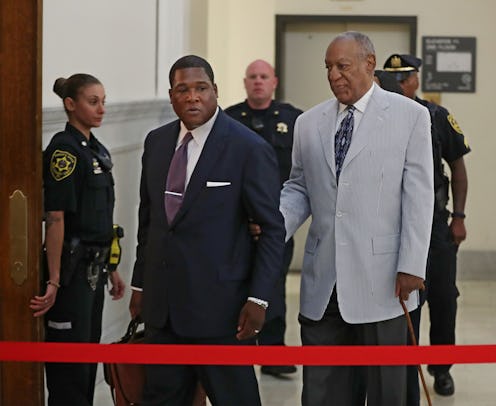News
Stop Making Bill Cosby Jokes
With the current maelstrom of publicity and scandal surrounding the accusations leveled against Bill Cosby, it's easy to forget that a few years ago, he was considered a beloved TV father. All of that changed in late 2014, when a video of comedian Hannibal Buress doing a bit about the rape allegations against Cosby went viral. Now that Cosby is a fairly universally-reviled symbol of rape culture at its finest — in spite of the former Cosby Show star denying the charges that are set to go to trial in 2017 — it's appalling to find that people still don't understand why reducing Bill Cosby to a punchline hurts survivors of sexual assault, rape and abuse.
Somehow, some people still don't understand that joking about Cosby — whether it's about how he supposedly "got away with it" for so many years, or worse, how he languished under his friendly paternal persona while allegedly raping so many women — is the same thing as joking about rape itself.
I was sexually abused as a child, and have experienced sexual assault to varying degrees as an adult. Whenever I hear jokes about Cosby, I literally feel the dread bubbling up in my stomach and, sometimes, get a gross taste in my throat, akin to that of swallowing a pill without water. I don't cry, I don't leave the room but I do feel the exact same sense of paralysis and stifled fear that comes with every rape joke I've ever heard.
Somehow, some people still don't understand that joking about Cosby — whether it's about how he supposedly "got away with it" for so many years, or worse, how he languished under his friendly paternal persona while allegedly raping so many women — is the same thing as joking about rape itself. Somehow, people don't realize that when they make those jokes, they are very likely making them in the presence of a survivor of rape, assault, or abuse.
There's a bizarre thing that happens in supposedly-progressive circles where highbrow discussions of current events, like how Cosby's trial date has been set, are undertaken in a tone of detached irony. These conversations often aren't center around the subject in question (like Cosby, or Woody Allen), but rather on the "stupidity" of the public who "allowed" them to get away with their alleged misdeeds. We (the passive members of these discussions) are given a number of reasons why it's "funny" that events played out the way they did, and are expected to feel the same sense of ironic, albeit morbid, humor as the speaker.
Often, we're treated to endless talk of the racism or sexism implied by the unfolding of these scandals. Often, the actual matter of the rapes in question is brushed aside.
I'm sick of having to talk about Bill Cosby, whether it's having to defend myself against would-be humorists who think it's "funny" that it's "just now being talked about," or having to defend his alleged victims from being blamed for their own rapes. There's so much to examine in this case (like the implicit racism in the ways we discuss and vilify Cosby), but as a survivor, I'm sick of having to be on the defensive.
When we allow public scandals as serious as the accusations against Cosby to become lightened by humor, we allow them to "get away with it," little by little. I'm of many minds about whether there are subjects that can't be joked about, but I firmly stand by the notion that there are acceptable ways to use humor to highlight societal ills like rape (and racism, and other forms of bigotry), and that the majority of those who attempt to joke about them get it wildly wrong.
It's not the place of people who haven't been raped or assaulted, or those who don't feel at risk of them every time they walk alone at night or go to a bar, to speak of rape in any way but with the utmost seriousness and sensitivity. Until someone who tells jokes about the current Cosby scandal treats me or other survivors with that sensitivity, I will continue to feel my stomach drop every time I hear someone laugh when mentioning his name.
